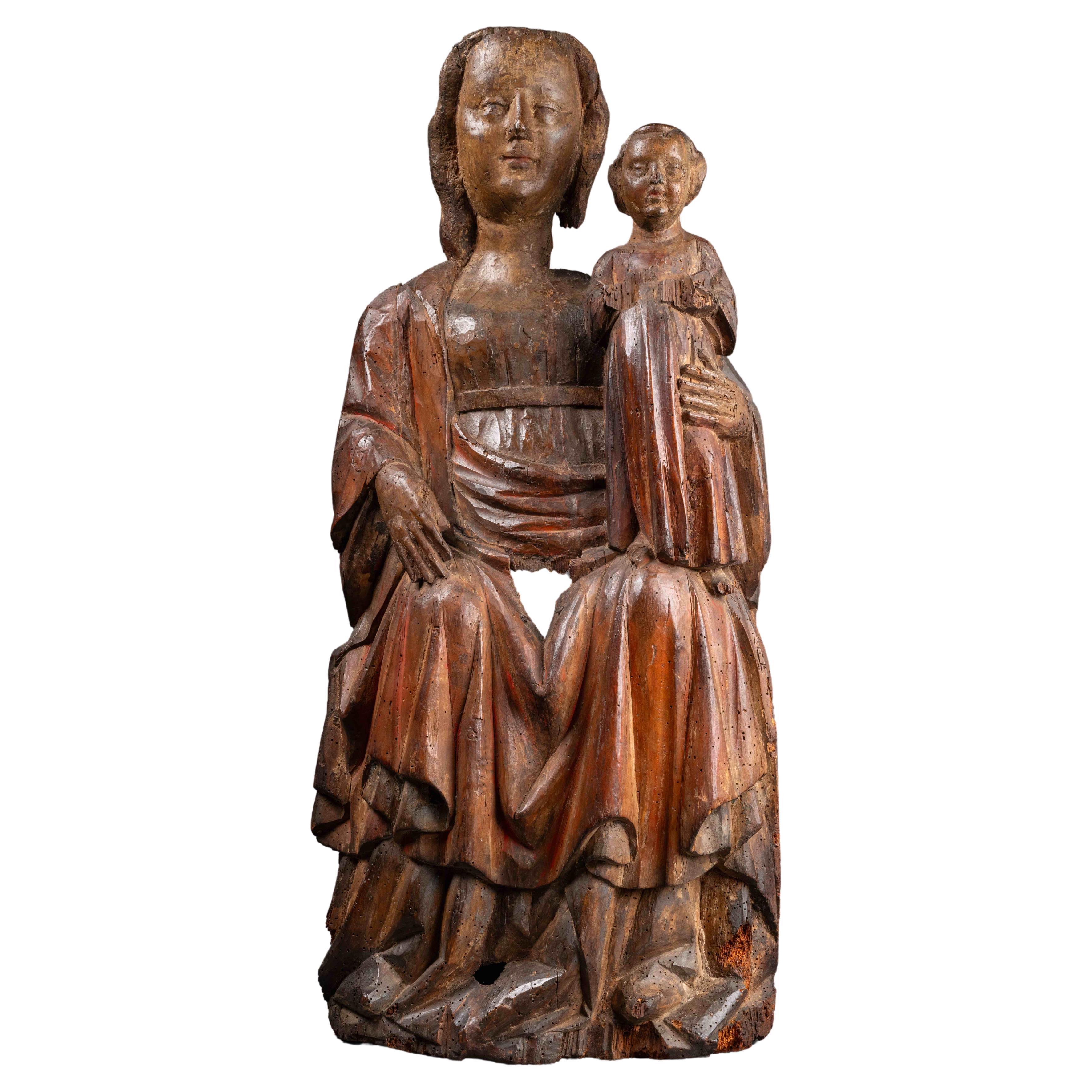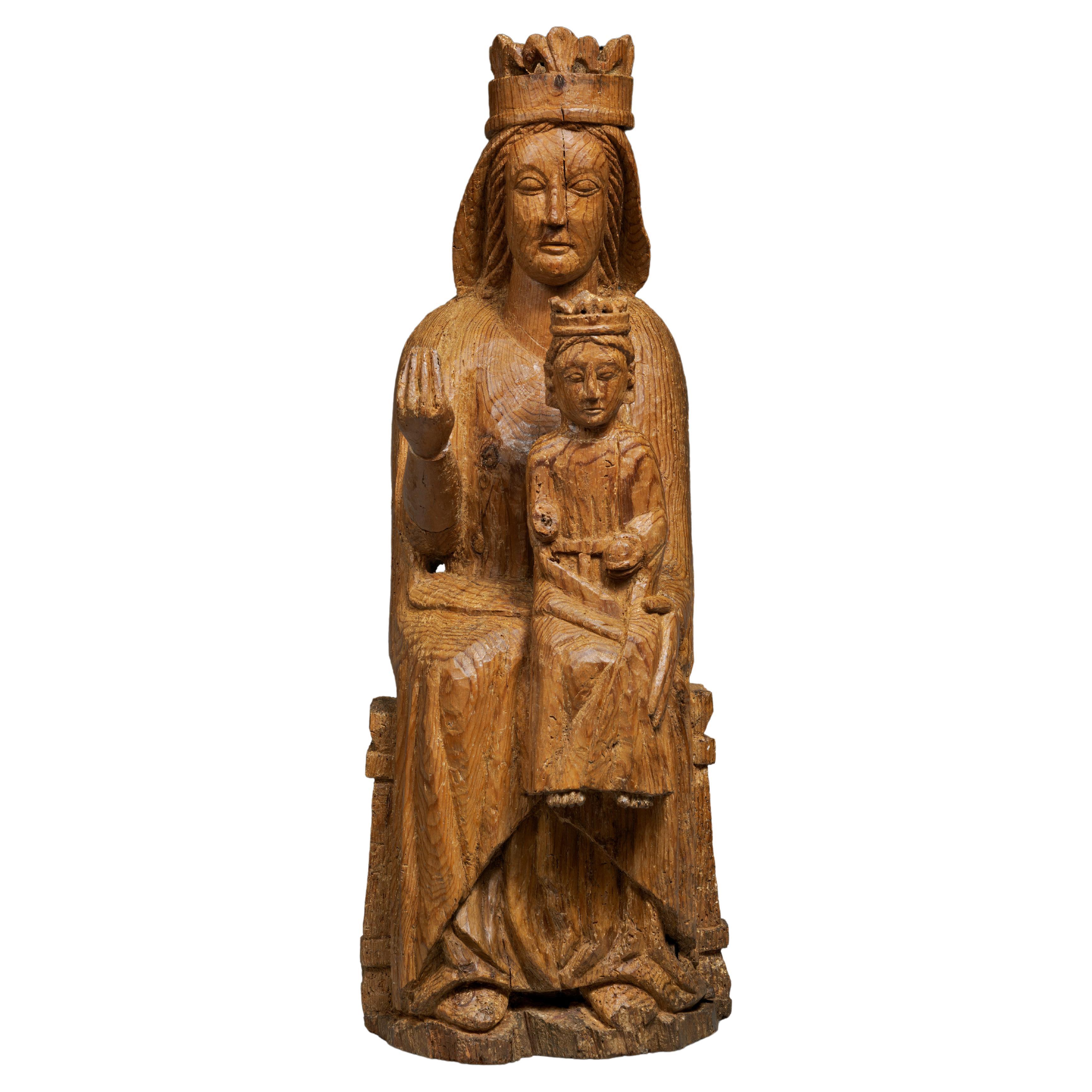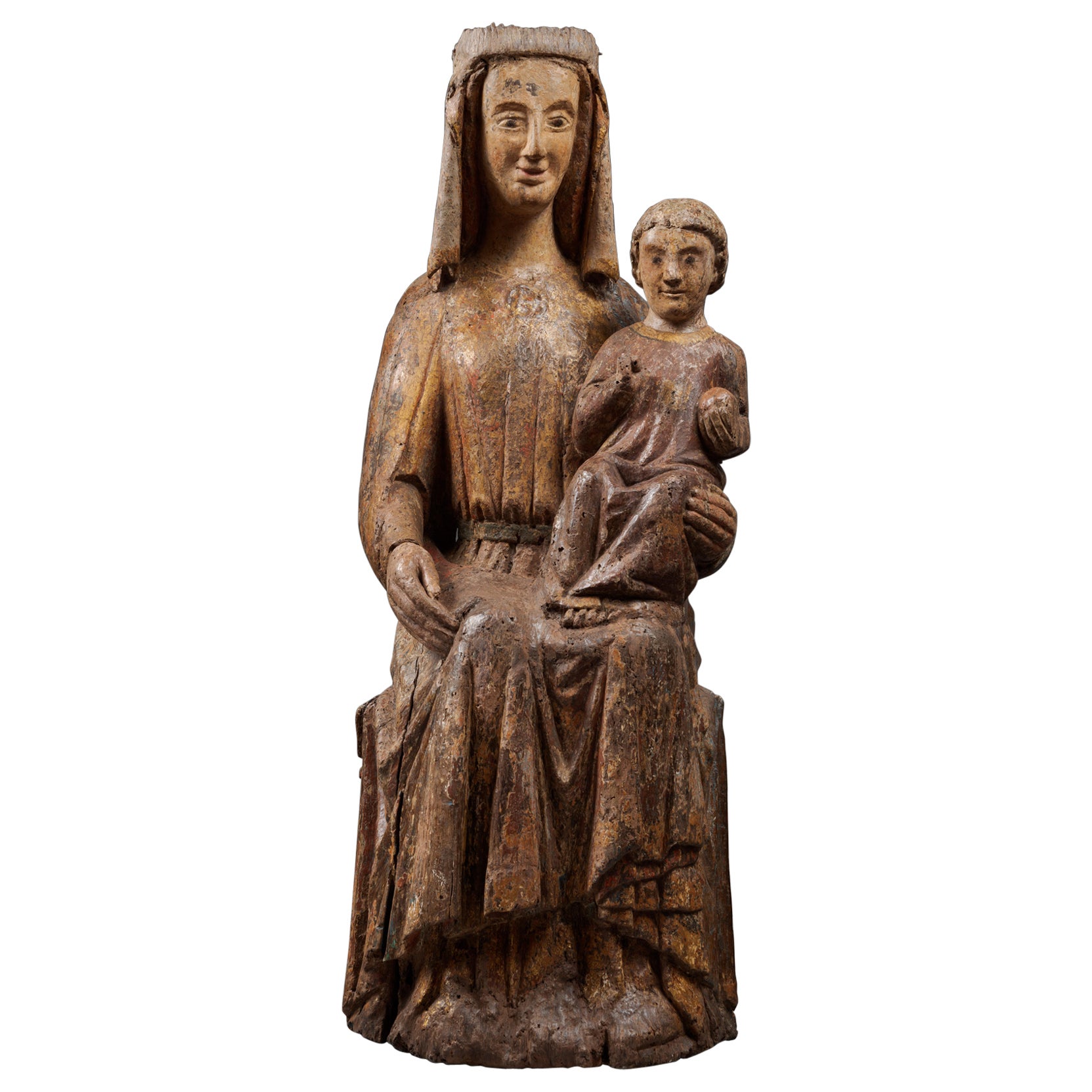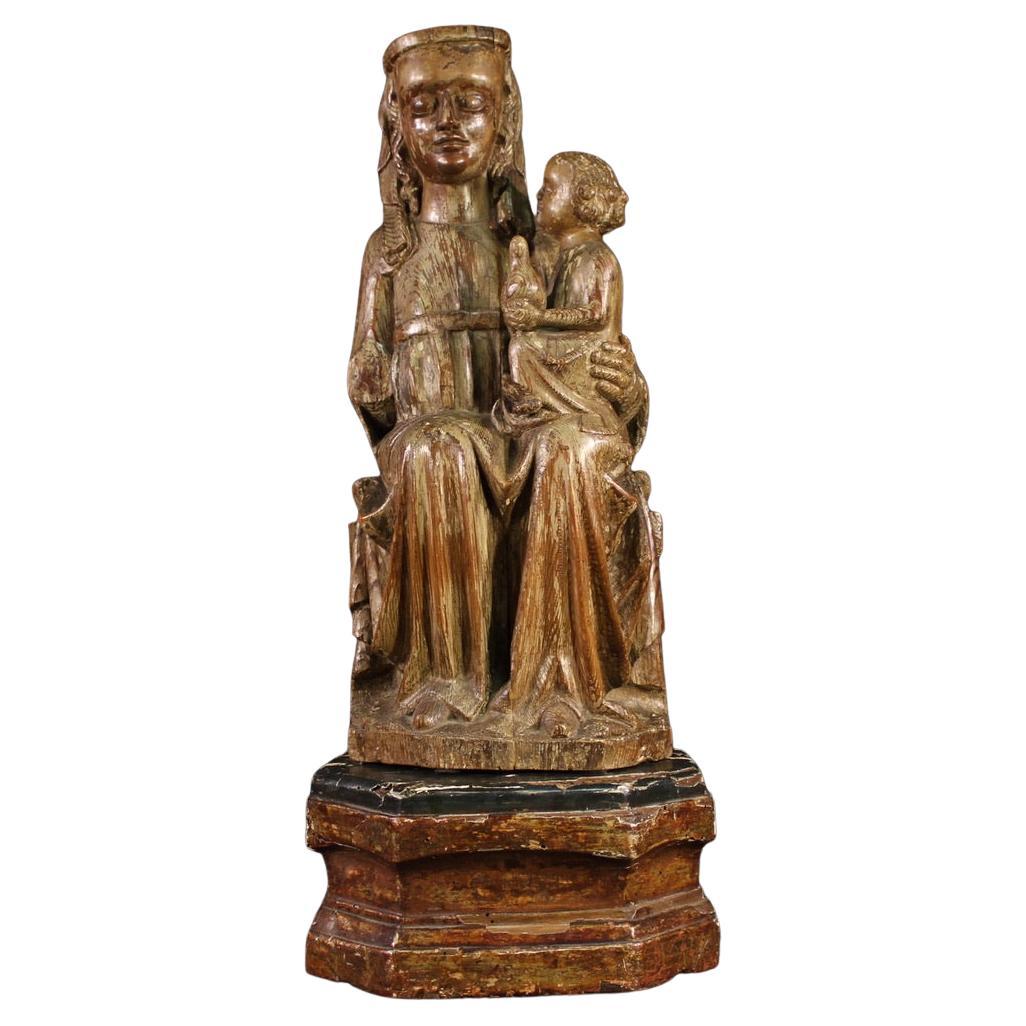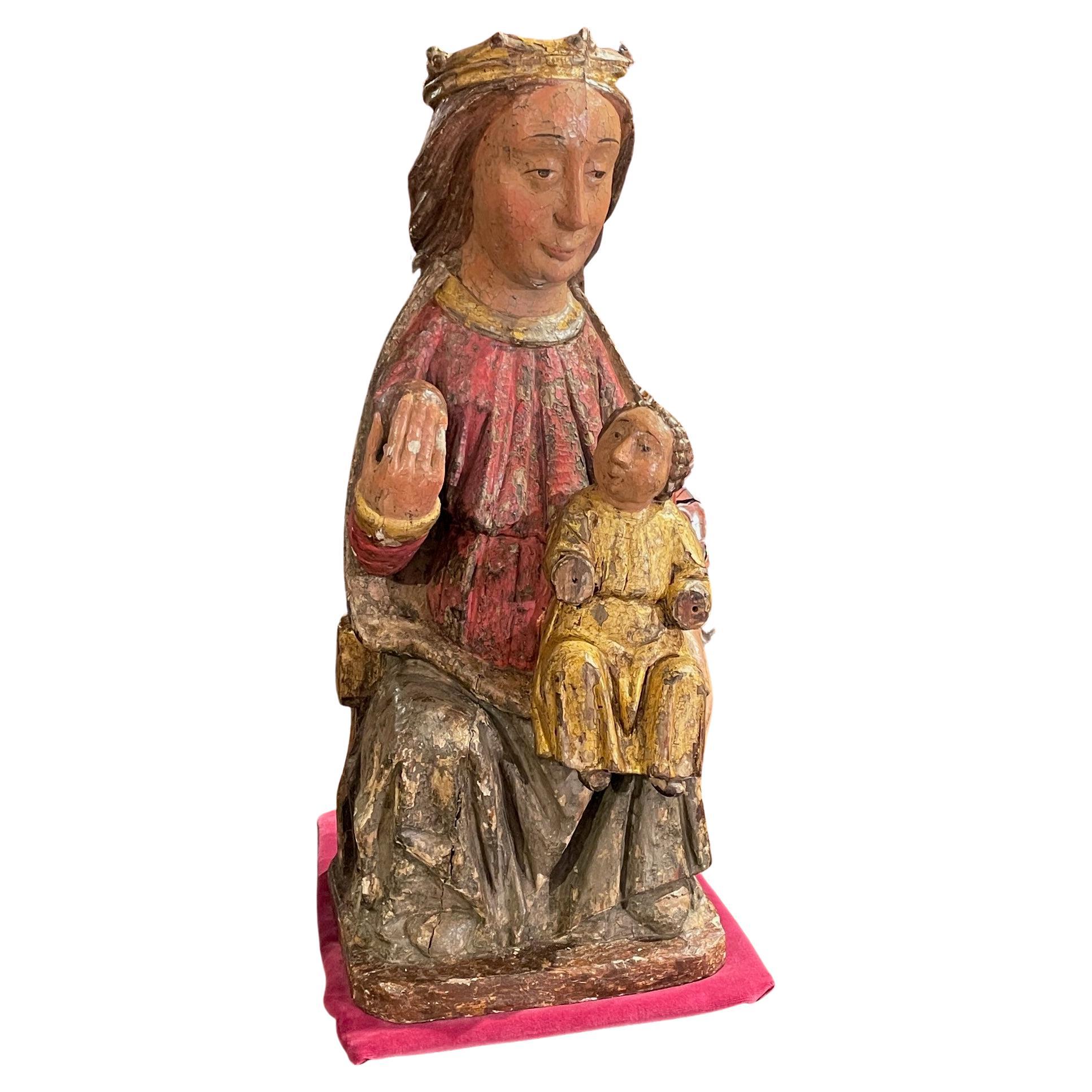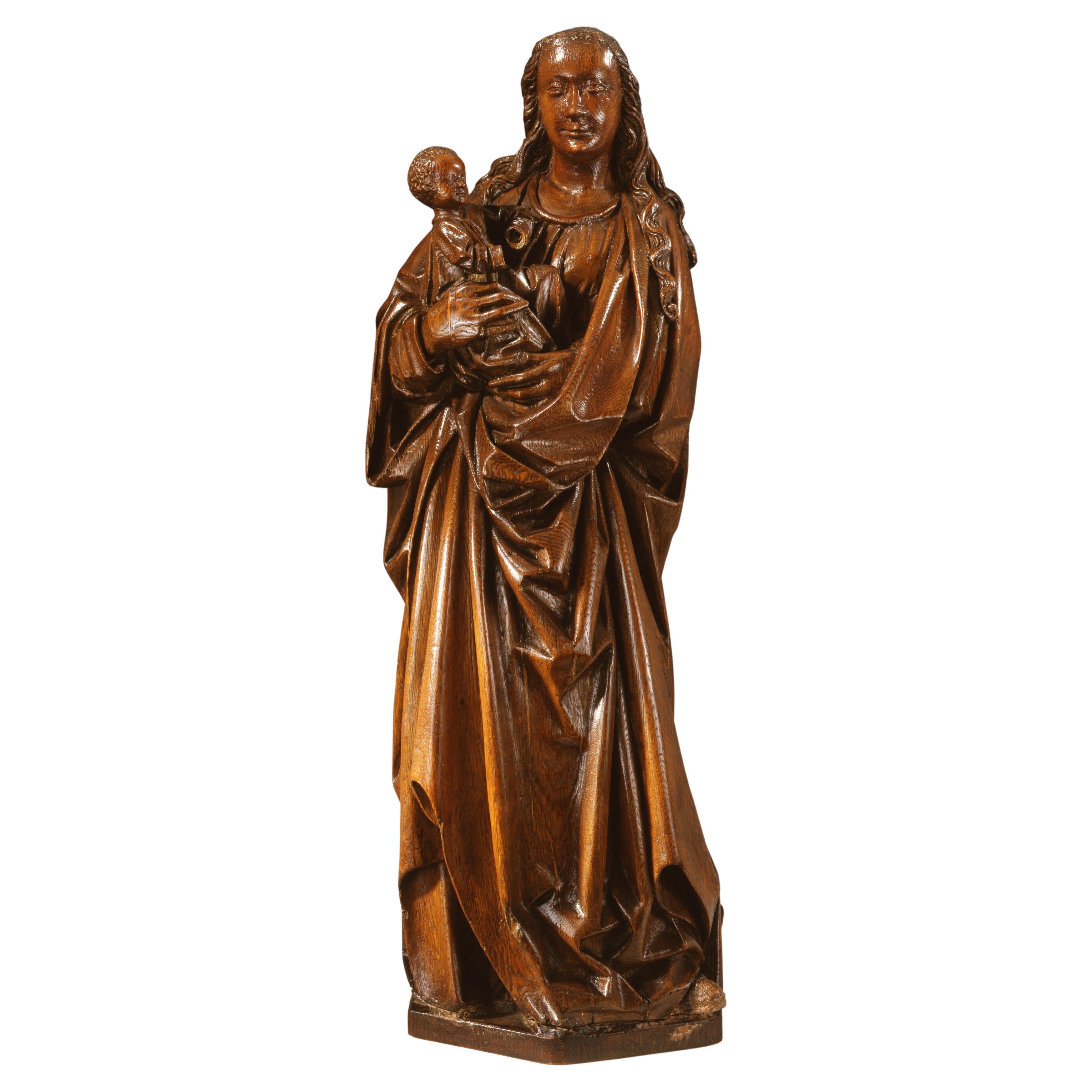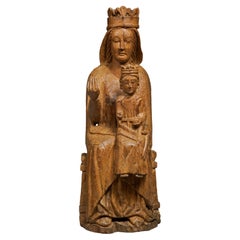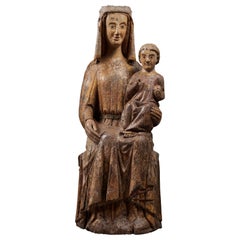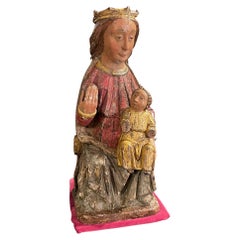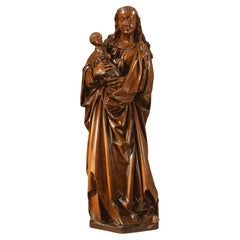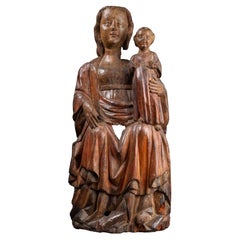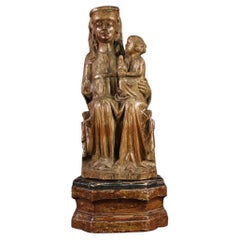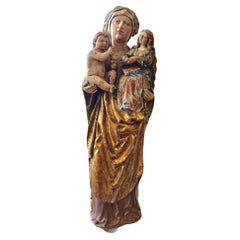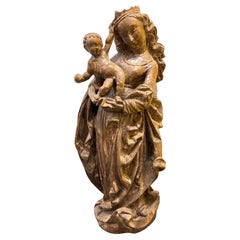Items Similar to 13th Century Virgin and Child from Catalonia
Want more images or videos?
Request additional images or videos from the seller
1 of 5
13th Century Virgin and Child from Catalonia
$35,815.78
£26,724.20
€30,000
CA$49,943.32
A$54,714.01
CHF 28,581.53
MX$657,772.93
NOK 357,318.82
SEK 337,008.59
DKK 228,443.79
About the Item
Seating on a bench-like throne the Virgin carries her child on her left knee.
She bears an important crown high on her head .The Virgin has an ovoid face with bulging eyes, straight long nose and thin lips. The hair parts in the middle and are carved as thick horizontals parallel hair strands. She wears a belted dress with a blouse effect on the waist and a cloak falling on her right knee with vertical pleats.
The crowned child holds his right hand up as a gesture of benediction.
The position of the Child is no longer as hieratic, or frontal as it was at the beginning of the twelfth century, but its face remains directed towards the viewer.
- Dimensions:Height: 36.23 in (92 cm)Width: 17.72 in (45 cm)Depth: 7.88 in (20 cm)
- Style:Gothic (Of the Period)
- Materials and Techniques:
- Place of Origin:
- Period:
- Date of Manufacture:Early 13th Century
- Condition:Refinished. Repaired. Wear consistent with age and use. Minor losses. Minor structural damages. Minor fading.
- Seller Location:Saint-Ouen, FR
- Reference Number:1stDibs: LU3115327312062
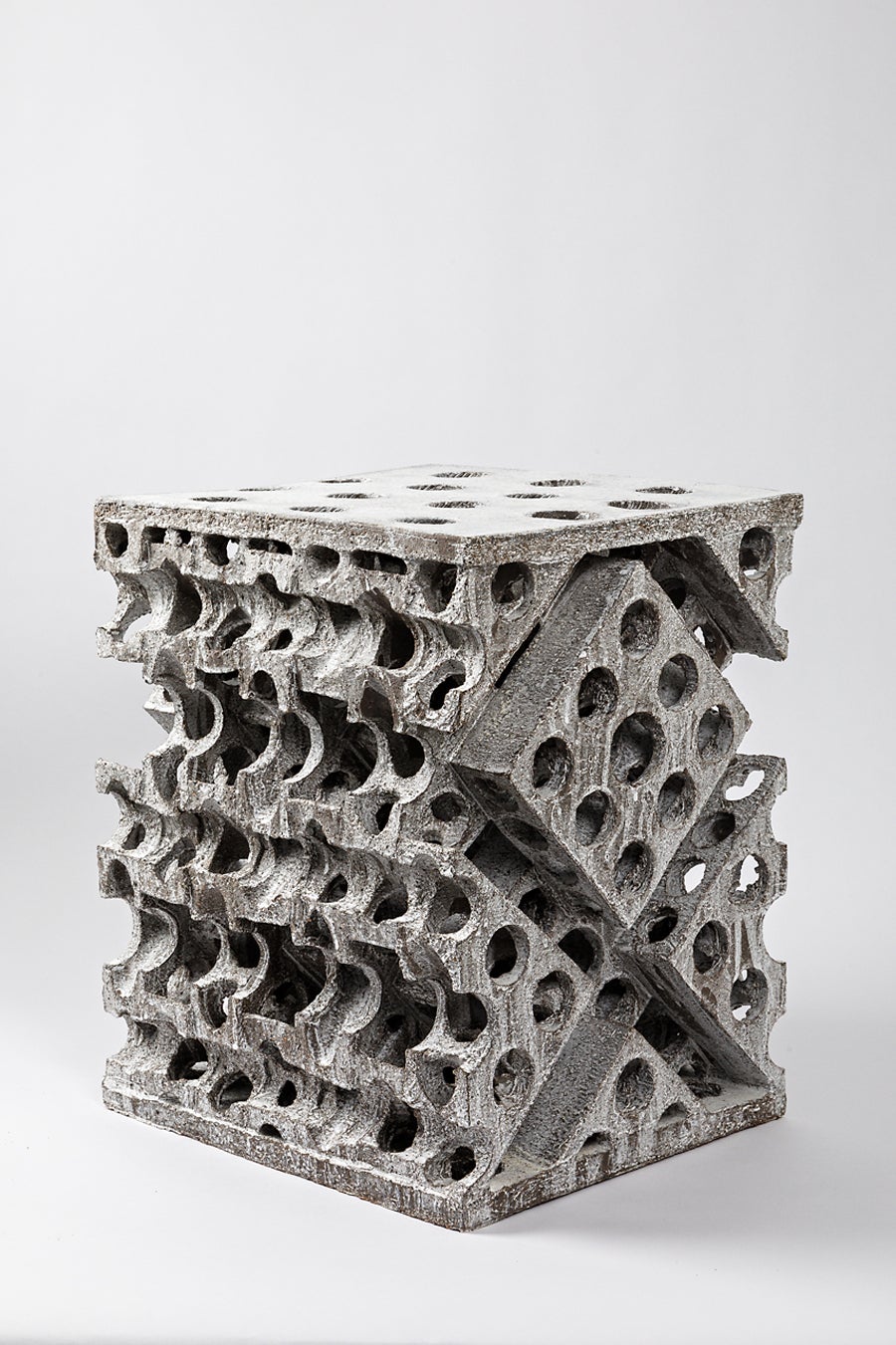
About the Seller
5.0
Vetted Professional Seller
Every seller passes strict standards for authenticity and reliability
Established in 2016
1stDibs seller since 2017
197 sales on 1stDibs
Typical response time: 3 hours
- ShippingRetrieving quote...Shipping from: Saint-Ouen, France
- Return Policy
Authenticity Guarantee
In the unlikely event there’s an issue with an item’s authenticity, contact us within 1 year for a full refund. DetailsMoney-Back Guarantee
If your item is not as described, is damaged in transit, or does not arrive, contact us within 7 days for a full refund. Details24-Hour Cancellation
You have a 24-hour grace period in which to reconsider your purchase, with no questions asked.Vetted Professional Sellers
Our world-class sellers must adhere to strict standards for service and quality, maintaining the integrity of our listings.Price-Match Guarantee
If you find that a seller listed the same item for a lower price elsewhere, we’ll match it.Trusted Global Delivery
Our best-in-class carrier network provides specialized shipping options worldwide, including custom delivery.More From This Seller
View AllVirgin and Child in Majesty, also known as "Sedes Sapientae"
Located in Saint-Ouen, FR
VIRGIN AND CHILD IN MAJESTY, ALSO KNOWN AS "SEDES SAPIENTIAE"
ORIGIN : SPAIN, CATALOGNE
PERIOD: EARLY 13th CENTURY
Height : 95 cm
Width : 32 cm
Depth : 28 cm
Softwood
No polychromy
In the middle of the 12th century, the Virgin took her place in churches, seated in Majesty, serving as a throne for her son Jesus. She is then called Sedes Sapientiae, meaning the Throne of Wisdom.
At that time, she is not represented for herself and only exists because she has been designated as Theotokos, the mother of God, at the Council of Ephesus in 431, where the divine nature of Christ was proclaimed from his birth.
The upright and perfectly hieratic bust of this Virgin and Child in Majesty is seated on a throne-bench. She is dressed in a tunic with a rounded neckline and covered with a fine mantle placed on her narrow shoulders. The supple and natural drapery follows the lines of the body.
Large curls frame her face with delicate and regular features, a long straight nose, almond-shaped eyes, and small lips.
She supports the Infant Jesus with her left hand. Like his mother, he is dressed in a long tunic, and his little feet are visible in the folds. He holds a small sphere in his left hand, while with his right hand, he gestures in blessing. The face of Christ bears a strong resemblance to his mother’s one, and he gives a slight smile.
The position of the Child is no longer as hieratic, nor frontal or central as in the early 12th century, but his face still turns towards the faithful.
The 13th century indeed emerges as a period of transition in the artistic domain. The statuary, while retaining certain characteristics still belonging to the habits of the previous century, also develops new formal solutions.
As a result, Mary maintains a hieratic and frontal position, while her son shifts to place himself well to the left on her knee. Similarly, while the Virgin seems perfectly still, Jesus, on the other hand, appears much more animated, especially in the positioning of his hands. His left hand holds the orb, and judging by the raised right arm directed towards the faithful, one can easily imagine that he was making a gesture of blessing.
The influence of the Sedes Sapientiae from previous centuries still seems particularly prevalent in this work.
These few characteristics allow dating this Spanish Virgin...
Category
Antique 15th Century and Earlier Spanish Gothic Figurative Sculptures
Materials
Softwood
Important Virgin and Child in Majesty
Located in Saint-Ouen, FR
Important virgin and child in majesty
Origin : Germany Or Eastern France
Époque : Second Half Of The 13th Century
Height: 104.5 cm
Length: 3...
Category
Antique 15th Century and Earlier Figurative Sculptures
Materials
Oak
Virgin and Child in Majesty
Located in Saint-Ouen, FR
Virgin and child in majesty
Origine: castille
Epoque: early 14th century
Measures: Height: 72cm
Length: 30cm
Depth: 25cm
Polychrome and gi...
Category
Antique 15th Century and Earlier Figurative Sculptures
Materials
Wood
$41,785
Gothic Virgin and Child from Flanders
Located in Saint-Ouen, FR
Exhibition
Museum Cantini, 1952, The art of the Middle Ages in the Marseille collections, n°101
Provenance
Former collection Louis Bresset (before 1952)
Former collection Profe...
Category
Antique 15th Century and Earlier Dutch Gothic Figurative Sculptures
Materials
Oak
Virgin and Child in Majesty with a Bird
Located in Saint-Ouen, FR
Virgin and child in majesty with a bird
Origin: Southern Germany Or Austria
Period: Late 13tth - Early 14th Century
Height : 87.5 cm
Length : 32 cm
Depth : 19 cm
Lime ...
Category
Antique 15th Century and Earlier Figurative Sculptures
Materials
Wood
Polychrome carved wood Virgin and Child from the 15th Century
Located in Saint-Ouen, FR
POLYCHROME CARVED WOOD VIRGIN AND CHILD FROM THE 15TH CENTURY
ORIGIN: SOUTH GERMANY, SWABIA, NUREMBERG REGION
PERIOD: 15th CENTURY
Height: 94,6cm
Width : 28 cm
Depth : 18 cm
Lime wood
Original Polychromy
Good state of conservation
From 1430 onwards, sculpture underwent a profound stylistic renewal which continued until 1530, the so-called late Gothic period. In the Germanic countries, original sculptures flourished in an expressive and sensitive vein.
This renewal was inspired by the art of Nicholas of Leiden, who was active in Strasbourg in the 1460's. His style broke with the refined and delicate art of the international Gothic style in force throughout Europe around 1400. The figures became more authentic and realistic. The bodies became denser. Clothes are animated by deep, broken folds, the fabrics are heavy and have a great decorative value. In addition, the polychromy is intended to be illusionistic. The painting makes it possible to restore the texture of the materials, the richness of the textiles and the natural skin tone of the characters.
The dissemination of images through engraving and the great mobility of the artists led to the success of this style, which conquered the Upper Rhine, Swabian, Tyrolean and Franconian regions, contributing to the formation of a common stylistic identity in these regions. The economic boom in the flourishing German cities was conducive to the development of original production. Attracted by this prosperity, numerous workshops were set up in order to meet the orders of religious communities, the Church and the laity, including a clientele of middle-class rockers.
This precious Virgin and Child is depicted standing on a crescent moon, her head encircled by a crown of tall flowers. Her long wavy hair spreads over her shoulders, framing her beautiful oval face. Under fine eyebrows drawn with a brushstroke, her almond-shaped, slightly drooping eyes look at the Child with infinite softness. She is dressed in a long red dress with a rounded neckline, belted under the chest. The heavy fabric of her dress spreads out in broken folds at her feet. On her shoulders she wears a golden cloak. The drapery has deep folds. She holds out her right hand while she holds the Christ Child with her left.
Christ, with his well-defined hair, is naked. His cheeks are highlighted with red, he holds an apple in his left hand and with the other hand makes a sign of blessing towards the faithful.
Virgins with Child on a crescent moon were very popular in the second half of the 15th century, especially as the central subject of altarpieces in southern Germany and Austria. The crescent moon on which Mary is standing is reminiscent of the Woman of the Apocalypse. Often equated with the Virgin Mary.
This episode is taken from the Book of Revelation (12:1-6)
1 Then a great sign appeared in heaven: a woman clothed with the sun, with the moon under her feet and a crown of twelve stars on her head. ; 2 She was pregnant, and she cried out because she was in labor, in pain from giving birth. ; 3 Then another sign appeared in heaven: it was a great fiery red dragon, with seven heads and ten horns, and seven royal crowns on his heads. ; 4 His tail swept down a third of heaven's stars and threw them to the earth. The dragon stood in front of the woman who was about to give birth so that when she gave birth, he might devour her child. ; 5 She gave birth to a son, a male child who is to rule all the nations with an iron rod. Her child was snatched up to God and his throne. ; 6 Then the woman fled into the desert, where God has prepared a place for her. There she will be taken care of for one thousand two hundred sixty days.
Some theologians see in this woman a reference to the Virgin Mary and in the child, Jesus.
This remarkable work is a very fine example of sculpture from Swabian workshops in the last decades of the 15th century. It presents all the characteristic stylistic elements: a highly girdled silhouette, an abundant drapery with angular folds, but also a great physical presence accentuated by the polychromy that restores the anatomical details. This group is made of a wooden log. The deep folds of the drapery highlight the movement of the Virgin holding the child.
Bibliography :
Sophie Guillot de Suduiraut, Dévotion et Séduction, Sculptures souabes des musées de France, vers 1460-1530, Paris musée du Louvre-Éditions somogy, 2015
“Revelation 12 - Common English Bible...
Category
Antique 15th Century and Earlier German Gothic Figurative Sculptures
Materials
Wood
You May Also Like
Virgin and the Child, Mosan Region, Second Half of 13th Century
Located in Bruxelles, BE
A polychrome sculpture depicting the Virgin and the Child
Mosan region, second half of 13th century
Polychrome wood
73 x 29 X 12 cm
Provenance :
Former Belgian private collection from the beginning of the 20th century
This remarkable early artwork portrays the Enthroned Virgin and Child, also known as Sedes Sapientiae, which translates to the 'Seat of Wisdom...
Category
Antique 15th Century and Earlier Belgian Medieval Figurative Sculptures
Materials
Wood
15th Century Wooden Antique Religious Sculpture Madonna with Child, 1470
Located in Vicoforte, Piedmont
A rare 15th-century religious sculpture. A finely carved wood work depicting the Madonna with Child, likely of Central European origin. Carved from a single block, with a separate, n...
Category
Antique 15th Century and Earlier German Figurative Sculptures
Materials
Wood
15th Century Gothic Virgin
Located in Madrid, ES
15th century Gothic Virgin
Gothic Virgin of the 15th century Virgin in carved and polychrome wood of the 15th century. In its original state, muse...
Category
Antique 15th Century and Earlier Figurative Sculptures
Materials
Wood
$20,892
Antique Statue of Virgin Mary and Child , 19th Century
Located in Basildon, GB
A Pine Carving of Virgin and Child signed E. Lechner. Carved in 15th Century style, a high relief with a hollowed back and depicting the crowned Virgin standing on contrapose with lo...
Category
Antique Mid-19th Century European Gothic Religious Items
Materials
Wood, Pine
Virgin with Child. Carved and polychrome wood. Spanish school, 13th century.
Located in Madrid, ES
Virgin with Child. Carved and polychrome wood. Spanish school, 13th century.
It has faults.
Polychrome wood carving that shows the Virgin sitting on a throne, with her right hand r...
Category
Antique 15th Century and Earlier Spanish Gothic Religious Items
Materials
Other
12th Century Rare Romanesque Wood Sculpture of the Virgin Mary
Located in Vero Beach, FL
12th century extremely rare romanesque wood sculpture of the Virgin Mary.
Magnificent wood hand carved sculpture of the Virgin Mary holding a book to her chest.
It is an extremely rare survivor of the 12th century. The style is European, possibly French or English. This statue is a testimony to beautiful religious art from about 1150. A truly rare Romanesque sculpture...
Category
Antique 15th Century and Earlier English Medieval Figurative Sculptures
Materials
Stone
$11,200 Sale Price
20% Off
More Ways To Browse
13th Century
Virgin And Child
Spanish Gothic Furniture
15th Century Spanish
13th Century Furniture
Spanish Furniture 15th Century
15th Century Oak
Throne Bench
Classical Bronze Statue
German Girl
Knight In Armour
Metal Decorative Trees
Reading Sculpture
Small French Sculpture
Vintage Wooden Molds
Wood Woman Carved
Antique Metal Statues
Apollo Gold
